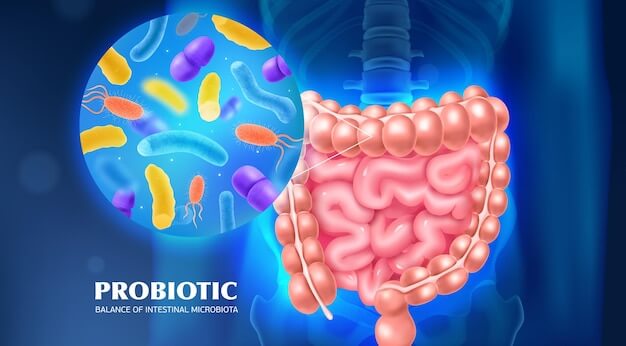Disease
The unknown intestinal flora is closely related to various diseases!
More and more studies have confirmed that intestinal flora imbalance is not only closely related to human digestive system diseases, but also closely related to endocrine system diseases, nervous system diseases, immune diseases and other health problems.

When it comes to bacteria, people always sniff that they are the culprits of many diseases. In fact, this is a long-term cognitive misunderstanding. Bacteria are inextricably linked to our health. Not all bacteria can cause us to get sick. On the contrary, some beneficial bacteria are very beneficial to human health.
The intestinal tract is the largest microecosystem of the human body, where there are about 100 trillion, more than 1000-2000 species of microorganisms with a weight of about 1-2 kg. They are interdependent and mutually restricted, jointly maintaining the balance of microecosystem in the intestinal tract, and playing a vital role in human health.
Once the internal and external environment changes due to diet problems and disease diseases, the normal flora combination is destroyed, and the ecological balance of intestinal flora is disturbed, flora imbalance will occur, which will lead to a series of health problems.
More than a hundred years ago, Mechinikov, a Nobel Prize winner in medicine and honored as the "father of lactic acid bacteria", believed that people with healthy intestines are healthy, and toxins produced by intestinal flora are the main cause of human aging and disease. His theory of self poisoning of human body holds that human garbage is deposited excessively in the body for some reasons, which leads to chronic poisoning and many diseases. However, due to the lack of direct evidence, the relationship between intestinal microbes and human health has not been well explained.
In recent years, with the continuous development and application of new research methods such as high-throughput sequencing and metagenomics, intestinal flora has become one of the most attractive focuses in the fields of microbiology, medicine, genetics, etc.
More and more studies have confirmed that intestinal flora imbalance is involved in the occurrence of many diseases, which is not only related to digestive system diseases such as acute gastroenteritis and chronic diarrhea, but also closely related to nervous system diseases such as autism and depression, endocrine system diseases such as diabetes and obesity, and immune diseases such as rheumatoid arthritis.

Intestinal flora and digestive system diseases
The intestinal flora is mainly located in the colon and rectum of the lower digestive tract, so it is most closely related to the digestive tract. Almost all digestive tract diseases are closely related to the intestinal flora, among which inflammatory bowel disease (IBD), irritable bowel syndrome (IBS), functional dyspepsia (FD), colorectal cancer and intestinal flora are the most popular.
- Inflammatory bowel disease (IBD)
Inflammatory bowel disease (IBD) is a special chronic intestinal inflammatory disease, including Crohn's disease (CD) and ulcerative colitis (UC). Research shows that most patients with inflammatory bowel disease have imbalance of intestinal flora, which occurs in the ileum, rectum, colon and other places where bacteria contact more. Aggressive bacteria grow excessively in the intestinal tract, causing excessive antigen in the intestinal tract to cause inflammatory reaction, thus reducing the self repair ability of the intestinal tract and losing its integrity. Multiple studies have proved that bacteria are the driving factor of IBD, and the number of bifidobacteria and lactobacilli in active UC patients is significantly reduced compared with the normal control group; The number of Enterobacteriaceae increased significantly compared with the normal group, and enterococcus and Clostridium parvum also increased. This indicates that the decrease of probiotics and the increase of conditional pathogenic bacteria such as enterobacteria in patients with active UC lead to intestinal flora imbalance, which may be one of the pathogenic factors of UC. However, the number of bifidobacteria, enterobacteria and other bacteria in remission UC patients was not significantly different from that in the normal control group, suggesting that the change of intestinal flora in UC patients was related to the severity of pathological changes in UC patients.
- Irritable bowel syndrome (IBS)
Irritable bowel syndrome (IBS) is a group of continuous or intermittent attacks, with abdominal pain, abdominal distention, defecation habits and changes in stool characteristics as clinical manifestations, while intestinal dysfunction diseases lacking gastrointestinal structure and biochemical abnormalities are human functional intestinal diseases with the highest incidence rate. The pathogenesis of IBS has not yet been fully clarified, but related studies have found that the number and types of related bacteria in different types of IBS patients may have different degrees of disorder. Compared with healthy people, the proportion of bifidobacteria in IBS patients is significantly reduced, while the proportion of enterobacteria is increased.
Intestinal flora and nervous system diseases
Studies have shown that intestinal microorganisms can regulate a series of host behaviors through gut brain axis. At present, the nervous system diseases related to intestinal flora reported in the literature mainly include autism, depression, schizophrenia, anorexia nervosa, multiple sclerosis, epilepsy, Parkinson, etc.
- Autism
Take autism as an example. Children with autism usually suffer from serious gastrointestinal diseases. Compared with healthy children, the diversity of intestinal flora of autistic children is reduced, and the number of Proctor, Fecal coccus and Veronicaceae in their intestines is significantly reduced. Moreover, the reduction of intestinal flora diversity and number of autistic children is significantly related to the degree of autism, but not to the degree of intestinal symptoms and diet composition. A clinical survey showed that autistic children generally used antibiotics excessively before the age of 3, and excessive use of antibiotics would lead to intestinal flora imbalance. It has also been reported that oral vancomycin has a certain effect on children with autism who have aggressive behavior in a short period of time. Bacteroides fragilis can improve the intestinal mucosal barrier function and behavioral symptoms of mice with autism.
- Depression and anxiety
Depression and anxiety are two of the most common psychological diseases. At the same time, depression and anxiety are also one of the most common complications of nervous system diseases. Patients with chronic diseases (such as Parkinson's disease, ALS, AD, stroke) are often prone to depression and anxiety symptoms. In 2015, researchers analyzed the structure of fecal intestinal flora of patients with depression and healthy people, and found that there was a significant difference between the structure of intestinal flora of patients with depression and healthy people. The proportion of bacteria belonging to the genus Physiobacteria increased significantly, while that of Clostridium tenella decreased significantly. In addition, the abundance of Clostridium species was negatively correlated with the severity of depressive symptoms.
- Parkinson
Parkinson's disease is a common neurodegenerative disease in the middle-aged and elderly, mainly manifested as static tremor, rigidity, motor retardation, abnormal posture and gait. In addition to motor symptoms, Parkinson's disease also has non motor symptoms such as severe autonomic dysfunction. Among them, constipation is one of the most common symptoms of autonomic dysfunction, with an incidence of 70% - 80%, and can occur at all stages of the disease, It may even occur before the onset of exercise symptoms. After comparing the differences between the feces and intestinal mucosa flora of patients with Parkinson's disease and healthy controls, the researchers found that the butyrate producing bacteria related to anti inflammation in the feces and intestinal mucosa of patients with Parkinson's disease were significantly reduced, while the bacteria related to inflammation were increased. At the same time, they also found that many kinds of bacteria were associated with the course of Parkinson's disease. It provides direct evidence that the intestinal flora is related to Parkinson's disease.

Intestinal flora and endocrine system diseases
The endocrine system is composed of endocrine glands and endocrine cells distributed in other organs, which regulate the growth and development of the body and various metabolism, maintain the stability of the internal environment, affect behavior and control reproduction. It is reported that endocrine system diseases such as diabetes and obesity are closely related to intestinal flora.
- diabetes
Diabetes is a metabolic disease characterized by hyperglycemia, which can be divided into type 1 diabetes and type 2 diabetes. type 1 diabetes is characterized by absolute insulin deficiency, and type 2 diabetes is characterized by insulin resistance and relative insulin deficiency. Research shows that the content of lactobacillus in intestinal flora of type 2 diabetes patients decreases significantly with the increase of blood sugar. Cytokines produced by intestinal flora stimulation will affect the sensitivity of the body to insulin and the efficiency of glucose metabolism. Before diabetes has positive clinical test indicators, there is often a long-term imbalance of diet, that is, increased intake of sugar and fat, relatively insufficient intake of dietary fiber. Long term changes in diet structure will lead to imbalance of intestinal flora, and imbalance of intestinal flora will lead to changes in permeability of intestinal mucosa, induction of intestinal immunity, and abnormal metabolism of glucose and lipid, resulting in positive clinical symptoms. During this time window, the dominant bacteria in the intestinal flora will change, such as Bifidobacterium and Bacteroids decrease, and Gram negative bacteria relatively increase.
- Obesity
As early as 2004, scientists found that certain bacteria in the intestine had a significant impact on human obesity. Later, the animal experiment scientists inoculated a kind of Bacteroides polymorphus VPI-5482 into the intestine of sterile mice, and found that its weight increased by 23% and insulin resistance appeared, indicating that Bacteroides has the role of promoting fat accumulation.
Zhao Liping's team from Shanghai Jiaotong University found for the first time that Enterobacter cloacae is a bacterium that can cause obesity. Its number in the intestinal tract of obese patients increased significantly, even up to 1/3. After reducing the number of Enterobacter cloacae in the intestinal tract through special nutrition, the weight of obese patients also decreased significantly.
How to maintain the balance of intestinal flora?
Since more and more experiments and clinical studies have proved that the imbalance of intestinal flora is closely related to the occurrence of various diseases, in order to make the body less troubled by diseases, what methods can we use in daily life to maintain our own intestinal flora balance?
- Diet
Long term ingestion of unhealthy food or food contaminated by harmful bacteria will lead to the increase of harmful bacteria in the body and the decrease of beneficial bacteria. Therefore, we should develop a good eating habit at ordinary times, eat on time and in quantity, eat more coarse fruits and vegetables, drink more water, and eat less raw and cold food with high oil and fat.
- Rational use of drugs
Long term use of antibiotics, such as amoxicillin and ampicillin, will also lead to imbalance of intestinal flora. Excessive antibiotics will not only kill pathogenic bacteria in the body, but also inhibit and kill beneficial bacteria. Therefore, these drugs should be used rationally. When they must be taken, they must also follow the doctor's advice, especially not be abused.
- Regularly eat and rest
In the long-term evolution process, intestinal flora has also formed its own survival habits. Irregular living habits such as staying up late, overeating and so on will cause imbalance of flora. Therefore, it is necessary to keep good habits of work and rest, not stay up late, and exercise more.
- Supplement microecological preparations
At present, microecological preparations mainly include probiotics, prebiotics and synbiotics. Probiotics are mainly found in Bifidobacterium, Lactobacillus acidophilus, Tyrosine bacteria, Bacillus licheniformis, etc; Prebiotics include fructo oligosaccharides and isomaltooligosaccharides; Synbiotics are biological agents with probiotics and prebiotics coexisting. Relevant studies have proved that intake of compound probiotics can stabilize the number and activity of beneficial bacteria and maintain the balance of intestinal flora in the event of flora imbalance.
-
![]()
![]() DiseaseDec 23, 2024
DiseaseDec 23, 2024Prevention of cardiovascular disease is more important than treatment
-
![]()
![]() DiseaseDec 22, 2024
DiseaseDec 22, 2024What Do I Need To Do To Check Myself For Nasopharyngeal Carcinoma? What Tests Are Needed To Confirm The Diagnosis Of Nasopharyngeal Carcinoma?
-
![]()
![]() DiseaseDec 21, 2024
DiseaseDec 21, 2024What Causes Oesophageal Cancer? What Symptoms Can Esophageal Cancer Cause In The Body?
-
![]()
![]() DiseaseDec 20, 2024
DiseaseDec 20, 2024Uremia Is Most Likely To Be "Dragged Out", The Body Appears 3 "Abnormal", Check As Soon As Possible
-
![]()
![]() DiseaseDec 19, 2024
DiseaseDec 19, 2024The unknown intestinal flora is closely related to various diseases!



